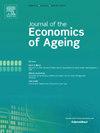被排除在“强制性”养老金计划之外:韩国国家养老金制度的晚期退出者
IF 2
3区 经济学
Q2 DEMOGRAPHY
引用次数: 0
摘要
在本研究中,我们研究了一个未被充分探索的机制,通过该机制,强制性养老金计划有效地排除了低地位的老年人。我们研究了在韩国最大的公共养老金计划——国家养老金制度(National Pension System)合格年龄之前退出的个人模式。我们分析了行政养老保险数据的个人有资格在60岁的一次性退还终身缴款,由于缴款记录不足-负选择亚人群。我们采用一组线性概率模型与几个固定效应规范来调查个人和地区层面的决定因素后期辍学。结果显示,累计缴费规模与退出概率之间存在独特的u型关系,这表明直接的预算限制可能是低地位工人退出的主要原因。我们还发现,劳动力市场历史不稳定的个人更倾向于选择退款选项,而区域经济衰退与取款增加有关。我们呼吁采取其他政策办法来保护经济上脆弱的国家,并为其他养老金后发国家提供启示。本文章由计算机程序翻译,如有差异,请以英文原文为准。
Exclusion from a ‘mandatory’ pension scheme: Late-stage dropouts from the National Pension System in South Korea
In this study, we investigate an underexplored mechanism through which a mandatory pension scheme effectively excludes low-status older adults. We examine the patterns of individuals dropping out from the National Pension System just before the eligibility age, the largest public pension scheme in South Korea. We analyze administrative pension insurance data on individuals eligible for a lump-sum refund of lifetime contributions at age 60 due to insufficient contribution records – a negatively selected subpopulation. We employ a set of linear probability models with several fixed-effect specifications to investigate individual- and regional-level determinants of late-stage dropout. Results reveal a unique U-shaped relationship between the size of accrued contributions and the probability of dropping out, suggesting that immediate budget constraints could be the primary reason for dropouts among low-status workers. We also find that individuals with unstable labor market histories are more inclined to choose the refund option, while a regional economic decline is associated with an increase in withdrawals. We call for alternative policy approaches to protect the financially vulnerable and provide implications for other pension latecomer countries.
求助全文
通过发布文献求助,成功后即可免费获取论文全文。
去求助
来源期刊

Journal of the Economics of Ageing
Multiple-
CiteScore
4.10
自引率
4.50%
发文量
46
审稿时长
49 days
期刊介绍:
The Journal of the Economics of Ageing (JEoA) is an international academic journal that publishes original theoretical and empirical research dealing with the interaction between demographic change and the economy. JEoA encompasses both microeconomic and macroeconomic perspectives and offers a platform for the discussion of topics including labour, health, and family economics, social security, income distribution, social mobility, immigration, productivity, structural change, economic growth and development. JEoA also solicits papers that have a policy focus.
 求助内容:
求助内容: 应助结果提醒方式:
应助结果提醒方式:


